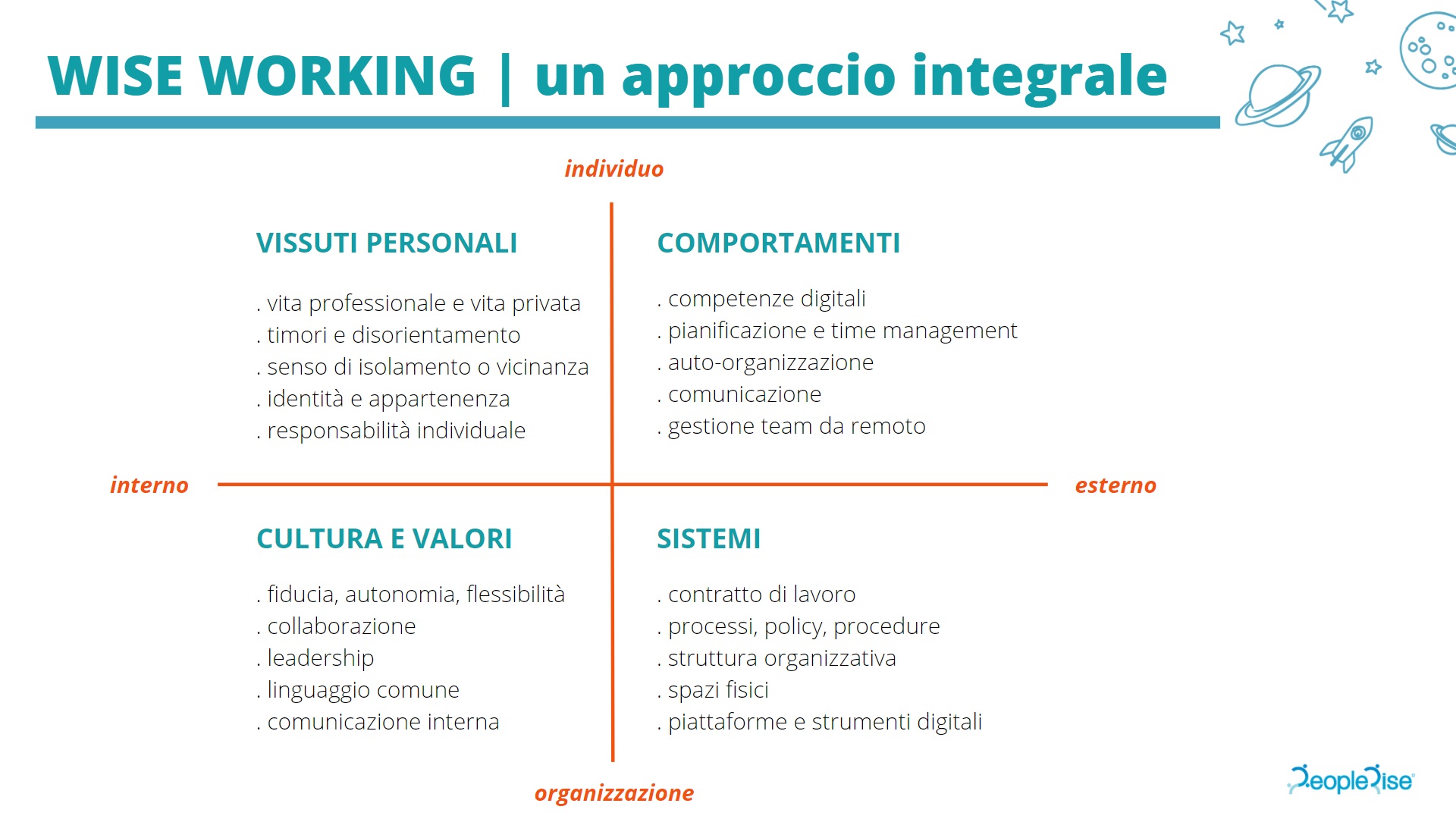Over the past few months, smart working has emerged in Italy, first of all as a possible experience and, secondly, as a topic of debate at various levels. We are discovering together, day by day, all the branches that the impact of this phenomenon can have, starting from the personal and social level, up to the organizational, political and environmental one.
Together with the colleagues at Peoplerise, we were immediately interested in this topic. As we told you, during the lockdown we experimented with a methodology called Reinventing Lab, designed to foster development and innovation. On this occasion, we launched a research and action lab on the topic of smart working and, in particular, on how to be Smart with heart. I’d love to tell you a little bit about what we discovered.
But first, let’s clear things up a bit. The Observatory of the School of Management of the Politecnico di Milano defines smart working as follows:
“Smart Working is a new managerial philosophy based on the return of flexibility and autonomy to people in the choice of spaces, times and tools to be used against a greater responsibility for results.”
Remote working is not Smart Working
In the dark all cats are grey. Then, when your eyesight gets used to it, you begin to discern colors. When you finally turn on the flashlight, that’s when reality becomes brilliant again in its nuances!
More or less the same thing has happened with smart working. For some of us, forced to work remotely for the first time, the magnitude of the novelty has been blinding. Similar to being in the dark, we looked around disoriented and, a bit at a time, we tried to turn on a light and give shape and color to things.
Day after day we discovered ways of working that we didn’t think were possible. We closed our eyes, plugged our noses and dove into the blue sea of digital. A sea that before seemed so far away from our personal world and, even more, from that of our organization.
For many, working remotely has been an opportunity to discover and appreciate new forms of autonomy, new time and space, new rhythms. Some people don’t even think about going back to the office.
In the same way, however, we have also experienced that working from home is not necessarily smart. There’s nothing smart about the tight schedule we’ve maintained when, between one meeting and another, there wasn’t even time to drink a drop of water. There’s nothing smart about those endless working days, where not even the physical boundaries of the office, which have now vanished, can help us to “not take work home”. And there’s nothing smart about managing frayed, unmotivated teams that struggle to make sense of what’s going on.

Photo by Arsalan Noorafkan on Unsplash
Wouldn’t Wise Working be wise?
Smart working is emerging as an organizational philosophy that values autonomy and accountability for results. Empowerment and flexibility are promoted, in the hope that they will, in turn, fuel motivation and engagement. To this new type of music, monitoring, delegation and self-organization dance, alternating and giving way to each other, moving into unexplored territories, in search of a new delicate equilibrium.
What we realized in the dialogues with our clients, especially with those who were forced to experience remote work, is that in order to ensure that work is truly smart, a profound paradigm shift is needed, one that roots new habits and behaviors in strong, shared values and feelings.
So we are helped by the notion of Wise Working, because only a wise transformation that questions the deep meaning of work can lead to healthy and lasting fruits.
A wise approach to work adopts a systemic perspective, which acknowledges the interdependence of all stakeholders and recognizes personal, organizational, social and environmental experiences and needs as equally important.
An integral model for a 360° perspective
To do this, we found the Four Quadrant Model, suggested by Integral Coaching, particularly useful, as it promotes a systemic view of the organization and takes into account the 360° work experience. The individual and collective points of view are integrated in a double matrix, which highlights both individual experiences and the concrete actions that these experiences channel.
During our workshop on smart working, we thought of integrating and repurposing it in this way:

Far too often, in initiatives to implement and support smart working, there is a risk of adopting a partial perspective, focusing on the emerging problem, at the expense of a systemic perspective.
And so we find projects that invest in digitization, purchasing hardware and software without worrying about how ready individuals are for such a change. Or, on the contrary, interventions that promote profound changes at the cultural level that are not supported by structural, factual and logistical aspects.
An integral approach helps us to act wisely, to avoid losing important pieces and to shed light on our blind spot, the one where it is sometimes hardest to look.
WHAT DO YOU THINK? WHAT DOES WORKING WISELY MEAN TO YOU?
